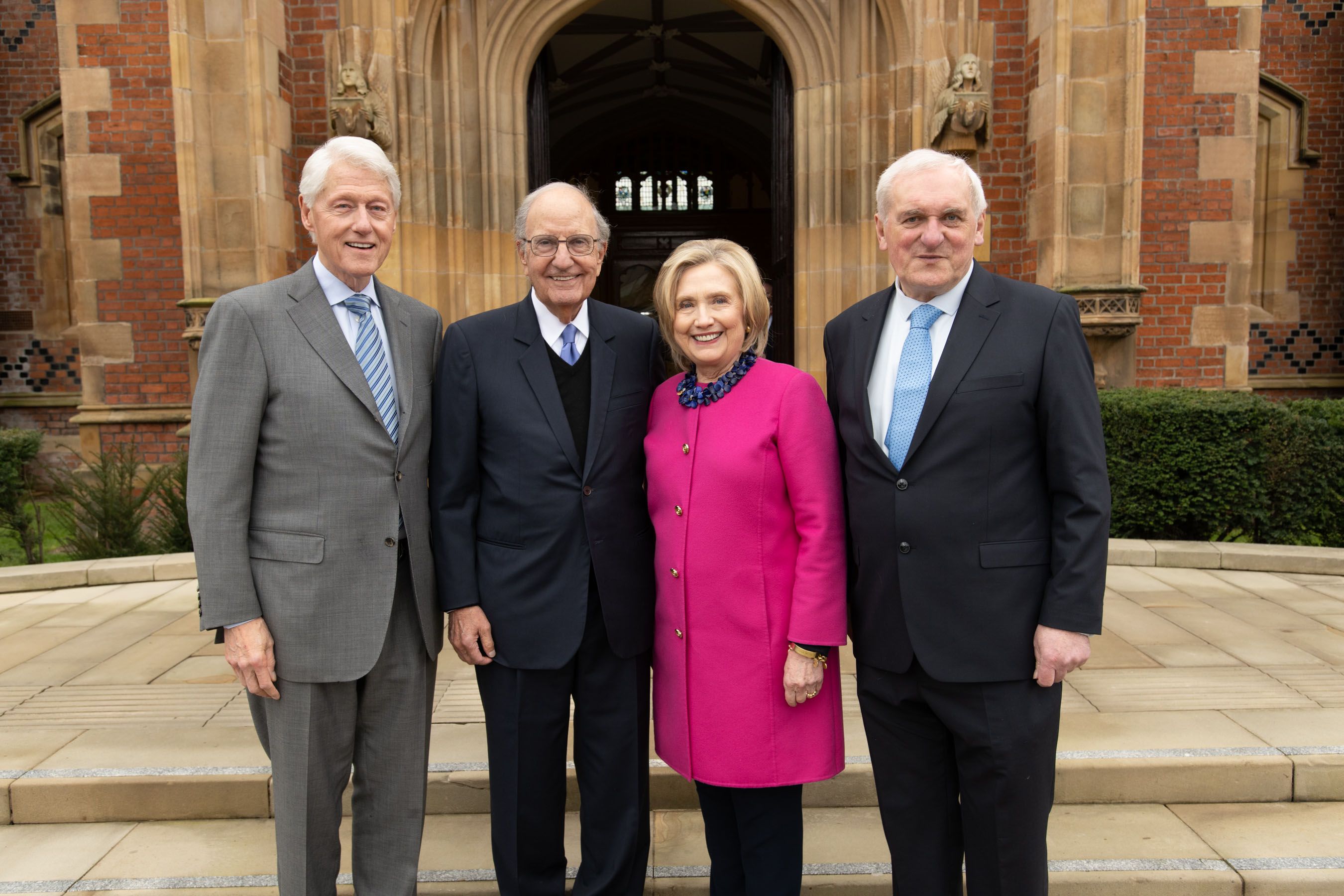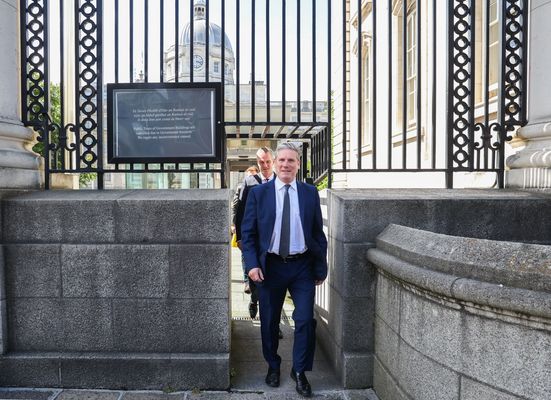IT wasn’t just that the GFA25 three-day conference at Queen’s was a “bubble” (Jeffrey Donaldson), it was worse: “prep for a united Ireland campaign” (Ian Paisley Jnr). Donaldson wasn’t present because it was more important to be in London where the “mood” was different: “There is a realism in London that frankly there isn’t at the event in Queen’s”.
DUP MP Ian Paisley says QUB’s #GFA25 conference nothing but “prep for a united Ireland campaign” - A “wake-up call” for unionists about the need to band together because “the enemy is at the gates”. The Newsletter https://t.co/5fFhXcmSf0
— Mandy McAuley (@mandy_mcauley) April 20, 2023
What nugget of “realism in London” Donaldson was referring to wasn’t clear. After all, only 22 Tory MPs had voted against the Windsor Framework, even if that did include some star back-bench Brexit Ultras (Andrea Jenkyns, Priti Patel, Iain Duncan Smith, Jacob Rees-Mogg, Mark Francois) and two former prime ministers, Liz Truss and Boris Johnson. Even most of the European Research Group seem to comprehend that the Brexit game is up, given that two former ERG chairs are now at the NIO and support the Windsor Framework.
Secretary of State Heaton-Harris used the GFA25 conference to warn the DUP that their continued withdrawal from Stormont was the "single biggest threat to the union”. The Prime Minister made similar remarks which The Daily Telegraph headlined as: “Back my Brexit deal or face a united Ireland, Rishi Sunak tells DUP”.
Oh 👀
— Marcella (@CellaH26) April 20, 2023
Back my Brexit deal or face a united Ireland, Rishi Sunak tells DUP https://t.co/WvIHT2uZaO
The DUP’s Strand 2 and Stormont boycotts of the GFA hang by a thread. Donaldson seems to think that something more can be squeezed out of Sunak, that any remaining Brexit-related legislative process at Westminster (e.g. the Retained EU Law Bill) can be tweaked to incorporate the DUP’s notion of consent in defiance of the GFA, or that the 222-year-old Act of Union can be “restored” to its original condition. But he’s clutching at straws. As Prof Chris Grey comments in his Brexit & Beyond blog, there are now “glimmers of realism” among Tories about the degrading effects of Brexit, economically and politically, even if “they are limited, painfully slow in coming, and fought every inch of the way by the Brexit Ultras”.
There is something truly alarming in reading a report like this about our own country, from a reputable publication in a friendly country: https://t.co/qqnhlaBxy8
— Chris Grey 🇺🇦 (@chrisgreybrexit) April 23, 2023
Not that some politicians have the self-awareness to care. We continue to hear the populist rhetoric surrounding Brexit, though more likely uttered by just a handful of DUP MPs and their fellow travellers. It is all over social media: “the EU jackboot” (one of the excuses to display the Nazi swastika on Twitter), “the subjugating protocol”, and “Northern Ireland is a colony of the EU”, are among the most common. Until six or so years ago, you were more likely to see the North referred to as a colony of England than of the EU. But such is the twisted, inverted “truth” of the era of Fox News and similar ventures in GB, now powerfully amplified on Twitter and other platforms, that some doubt that the GFA would even be possible nowadays.
Murdoch may have settled for $788 million last week, because Fox News knowingly and persistently lied about Trump’s 2020 defeat, but he did so to avoid having to take the stand and expose the channel’s audience to some truths about how it is treated by presenters. This was damage limitation to protect “market share” of audience, for rolling news as entertainment and for the reinforcement of right-wing stereotyping and prejudice. “Letting go” Tucker Carlson could have the opposite effect.
Tucker Carlson, who is leaving Fox News, is facing a lawsuit from his former head of booking who says she was subjected to a hostile and discriminatory work environment. https://t.co/NCDpKjdynH
— The New York Times (@nytimes) April 24, 2023
Legal challenges may check the worst excesses of culture wars, character assassination, misrepresentation and incitement to hatred, but alone they cannot reverse the trend towards hard right narratives within electronic and social media.
But back to the “colony” question. Last week we had the spectacle of DUP leaders expressing outrage at being urged to go back to Stormont by their former ERG mates and the prime minister of the union. There were also lectures from the same sources on the state of local finances, coupled with threats to charge for water, prescriptions and other things. “Vicious”, “brutal”, and even “undeliverable” cuts will be imposed by Westminster in what Conor Murphy describes as a “punishment budget”. But, in the DUP mindset, an international agreement on the terms of trade in goods makes “Northern Ireland a colony of the EU”, yet they see nothing colonial in being told what to do by England and having little or no democratic control over public finances.
It is worth recalling that the “colony of the EU” meme is itself a colonial implant. It was invented as part of the Brexit campaigns and made popular by ex-prime minister Johnson, among others. He famously used the phrase “economic semi-colony” in his speech to the DUP conference, 24 November 2018, the one in which said that “no British government could or should sign up to any arrangement” that included a border down the Irish Sea. Ten days earlier his overpaid Daily Telegraph column described Theresa May’s proposed withdrawal agreement as based on “terms that might be enforced on a colony”.
Well, here we are five years later with Johnson’s protocol and Sunak’s framework. Anger at these about turns is understandable, but only if you start from the premise of trusting the British. If you don’t, then the policy switch is not so surprising or upsetting. Much worse is that Sunak is now imposing serious damage to public services in the North. There is an opening here for the DUP to go back to Stormont claiming they have rescued public services with a bit of extra cash from the Treasury. But we should be less concerned with DUP political face saving and much more worried about Sunak’s economic policies.
Sunak’s government is at best lukewarm about public services and seems to be more concerned with changing the United Kingdom into the “Unicorn Kingdom”.
There’s nothing quite as Brexit-fantasy-land as launching a campaign called “Unicorn Kingdom”. https://t.co/0sTBAbxNSP
— Dr Mike Galsworthy (@mikegalsworthy) April 24, 2023
There is no plan to rescue the NHS, no plan to stop schools literally falling apart and no coherent approach to wage settlements across the public sector. In short, there is no positive vision of well-run, well-financed public services as a good thing in their own right, or of public services as vital to a sustainable economy. You don’t improve productivity with a poorly educated workforce and there will be labour shortages if people are too sick to work because of collapsing health services.
Instead Sunak tries to convince us that decent wage increases for nurses and doctors, among many others, are inflationary. In fact, profits have risen faster than wages across most sectors and most of Europe.
The ECB's Isabel Schnabel in a speech yesterday: "Rise in profits has played an important role for the rise in domestic inflation" @Isabel_Schnabel pic.twitter.com/hPbj49NphM
— Philipp Heimberger (@heimbergecon) April 20, 2023
Food price inflation is now running at 19% per cent in Britain and 16 per cent in the Republic, though the long-term trend in Britain is far worse than the South because of the fall in the value of sterling. The lower people’s household income, the more of it is spent on food and other basic necessities, so not addressing food inflation amounts to a policy of poverty promotion. It is “greedflation” that needs to be tackled.
Based upon the authoritative report from @unitetheunion exposing the role of greedflation pushing up food prices it is impossible to understand why the demand for price controls on basic foodstuffs has not been taken up by any opposition party. https://t.co/gTEHoSYy4L
— John McDonnell MP (@johnmcdonnellMP) April 23, 2023
Of course, the debate continues to flare up over how much of inflation, or the general state of public services, is due to Brexit. The best answer is “some” and “quite a lot”.
Once a country makes a mistake of the scale of Brexit which the perpetrators refuse to acknowledge, the cascade of consequences is profound. Everything is polluted. Britain in Crisis: The UK Faces a Steep Climb Out of a Deep Hole - DER SPIEGEL https://t.co/3tyaftGEGG
— Will Hutton (@williamnhutton) April 23, 2023
We are now faced with the extraordinary contrast between devastating cuts in the North while the South discusses what to do with a €10 billion budget surplus this year, rising to a total of €65 billion by 2026. Some say the economy is at capacity so don’t spend it: put it towards debt reduction or into reserve funds instead. Whatever else is chosen, how about putting a couple of billion into a unity transition fund? Call it a GFA implementation fund if needs be.







